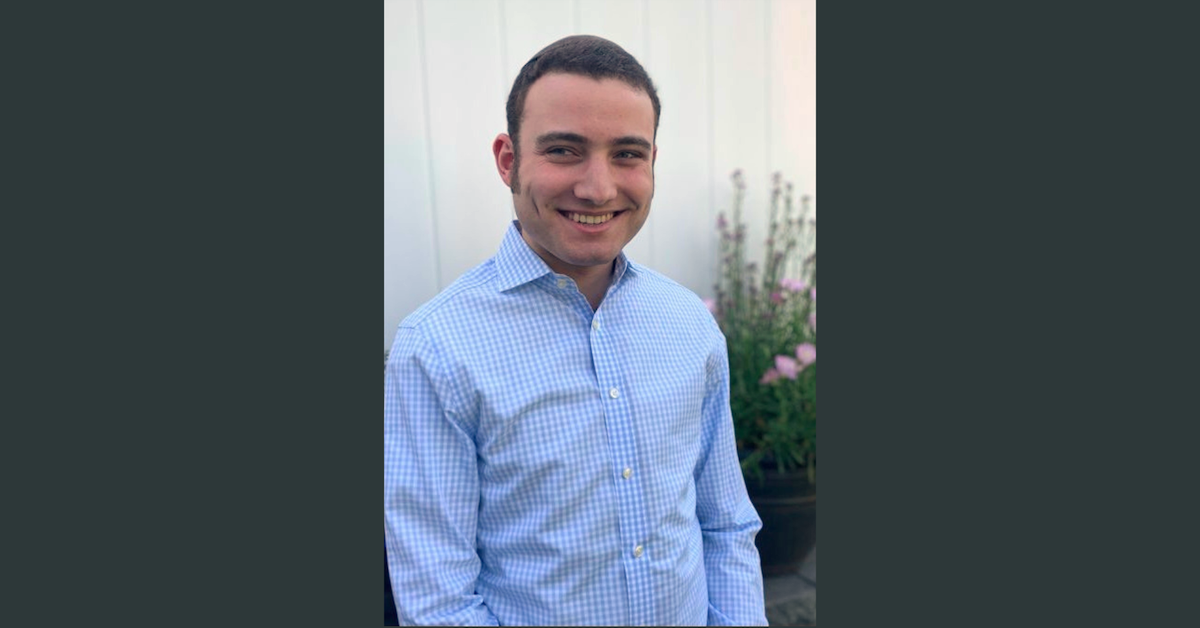Jun 27, 2022 By: yunews
 Yehuda Goldberg
Yehuda GoldbergWhy did you choose to study at YU? I never really considered anywhere else. YU has been a part of my life for as long as I can remember, as my father teaches here. I also wanted to study in Rav Michael Rosensweig’s shiur. I remember my first time hearing a shiur by Rav Rosensweig. It was awe-inspiring. The ability to gain from Rav Rosensweig’s Torah and personal insight is, to my mind, reason enough to come to YU. There’s another reason that drew me to YU, which is the unique religious and intellectual heritage of the institution. It’s been the home of countless rabbinic figures and scholars who have found a way to integrate various elements of Western thought into their lives as Jews. In many ways, I was going to college for that exact purpose, so YU was a natural choice. How has your participation in the Straus Scholars Program impacted your intellectual journey at YU? I think Rav Aharon Lichtenstein once commented that if you were to ask him what he learned from all of his vast reading in Western thought, he would say an appreciation of the complexity of the world. I think studying both Torah and Western thought at the Straus Center gives you an appreciation of that complexity. I think the hope for those studying in Straus is often an integration of Western thought with a Torah worldview. What I learned from the professors at the Straus Center is that this integration is not just challenging, but extremely complex. Judaism almost never completely agrees or disagrees with a political position or philosophic claim. For this project to be more than the meeting of two strawmen, one needs a tremendous amount of knowledge, intellectual honesty, and yiras Shamayim (awe of God). I think a deeper appreciation of this fact is something I gained from studying at the Straus Center, and it has played an important role in my intellectual journey. Describe a highlight of your time at Yeshiva University and the Straus Scholars Program. A highlight of my time at the Straus Center has been my “chavrusa” (shared study) with Dr. Neil Rogachevsky on Aristotle’s Ethics. We began meeting once a week when I returned from Israel and continued until my last semester at YU. The ability to study individually with a professor, reading a text as rich as Ethics, was really an incredible experience for me. This “chavrusa” also provided a forum for me to ask Dr. Rogachevsky about books, questions in political philosophy, and for general advice. He has really been a key mentor for me at YU. Which Western texts or thinkers that you studied impacted you as a Jew, and which Jewish texts or thinkers that you studied impacted you as an American? Broadly speaking, I connect with religiously-oriented writers. Towards the end of high school, I spent a lot of time reading Alasdair MacIntyre. C.S. Lewis has always been a favorite of mine, and I delved into religious humanism a lot this year. My teachers and rebbeim have also played a significant part in forming the way I see my role as an American and my political views. Studying with Rabbi Meir Soloveichik at the Straus Center gave me a sense of the deep connection between many American values and Jewish values. Rabbi Soloveichik’s use of history, political thought, and Torah to emphasize this point has certainly had an impact on me. Furthermore, studying with Rav Rosensweig has given me an appreciation for the nuance of the Torah’s approach to the world, making me wary of partisanship and narratives that seek to unequivocally bind Judaism to one political party or another. My time at YU, and Yeshivat Har Etzion as well, have helped me understand my American identity and my political views as an expression of a constellation of specific values and responsibilities. This conviction has really come from reading certain Jewish thinkers, most importantly Rav Lichtenstein. What are your plans for after graduation? After graduation, I hope to continue my studies at YU in the RIETS Semikha program and the Bernard Revel Graduate School of Jewish Studies. I will also serve as the Rabbinic Intern at the Straus Center. Any final thoughts on your experiences at the Straus Center and Yeshiva University? When people ask me about the Straus center, I often describe it as a home for people who are interested in studying both Torah and Western thought at YU. Some people come to Straus primarily interested in politics and want to have that interest more deeply rooted in Judaism. Some, like me, really wanted to study great books in college and wanted Jewish texts to be in conversation, explicitly, with those books. Some students major in STEM fields but care deeply about studying the great works of Torah and the West. I find these different aims create a rich intellectual environment that is refreshing and inspiring. I’d like to see this facet of the Straus Center develop more in the coming years. I hope people really come to see the Straus center as a meeting place, a home, for people who want to seriously engage Torah and Western thought, regardless of their vocational choices. To learn more about the Straus Scholars Program, click here. You can learn more about the Straus Center by signing up for our newsletter here. Be sure to also like us on Facebook, follow us on Twitter and Instagram and connect with us on LinkedIn.
